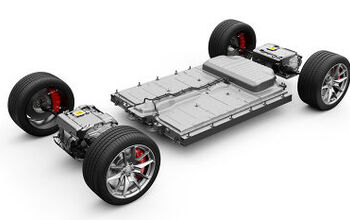NHTSA Gives Hyundai Safety Whistleblower $24 Million

The National Highway Traffic Safety Administration (NHTSA) has announced it is making its first ever whistleblower award. The U.S. regulatory body has decided to give over $24 million to a whistleblower providing information related to Hyundai Motor America and Kia Motors America. While not named by the NHTSA, it’s undoubtedly talking about Kim Gwang-ho — a South Korean engineer who flew to Washington in 2016 to squeal that his employer had been skirting safety regulations.
Armed with an internal report from Hyundai’s quality control team, Kim told the NHTSA the company was not taking sufficient action to address a presumed engine defect that increased the risk of crashes. It looks like the decision paid off for him, too. Hyundai Motor Group was struck with sizable regulatory penalties and Kim is now getting a huge payout from U.S. regulators right before the Department of Transportation proposes updated regulations pertaining to the automotive whistleblower program Congress created in 2015.
From NHTSA:
The whistleblower provided NHTSA with information related to Hyundai and Kia’s violations of the Safety Act. In November 2020, NHTSA issued Consent Orders with Hyundai and Kia reflecting the agency’s assessment that both Hyundai and Kia conducted untimely recalls of over 1.6 million vehicles equipped with Theta II engines and inaccurately reported crucial information to NHTSA about the nature of serious defects in the engines. The combined penalties in the Consent Orders amounted to $210 million, $81 million of which was paid in cash to the United States government. By statute, NHTSA may award a maximum of 30 [percent] of collected monies to a whistleblower found to contribute significant information to an action that results in penalties of more than one million dollars.
“Whistleblowers play a crucial role in bringing information to NHTSA about serious safety problems that are hidden from the agency,” elaborated Dr. Steven Cliff, NHTSA’s Deputy Administrator. “This information is critical to public safety and we are committed to rewarding those who bring information to us.”
Safety regulators have also said that the NHTSA has been working to improve its protocols for whistleblowing, claiming that it would become an invaluable tool for ensuring the industry is on its best behavior moving forward. This includes a provision from the Vehicle Safety Act that ensures whistleblower confidentially while also allowing the agency “to pay a monetary award to a whistleblower whose information leads to the successful resolution of an enforcement action for violations of law.”
Though we already know it was Kim Gwang-ho, who has openly stated he was pleased with the compensation provided by the U.S. government.
The NHTSA and DOT have said they would like to see recalls handled in a more timely fashion and institute penalties for automakers that were dragging their feet on fixes. Hiring employees to tattle on their bosses is undoubtedly an effective way of accomplishing this and it’s assumed that U.S. regulators will be leaning into the tactic now the NHTSA has issued the largest-ever reward for being an industrial informant.
Regulations can help keep automakers (who are always looking for ways to reduce costs) from doing something dangerously selfish. But they’re also capable of abusing their power and overreaching to a point where they become part of the problem. This time around, things seem to be on the level. But one wonders about the long-term ramifications of a government regulator effectively buying the truth so it can financially penalize industry players. Regardless, knowing that your staff could easily decide to cash in with the NHTSA should be an effective deterrent. Hopefully we’ll see this program handled fairly.
If you’re working at an automaker and would like to rat them out for something, The NHTSA has recourses available explaining what kind of shenanigans it’s interested in and how you can protect yourself legally.
[Image: dragon_fang/Shutterstock]

A staunch consumer advocate tracking industry trends and regulation. Before joining TTAC, Matt spent a decade working for marketing and research firms based in NYC. Clients included several of the world’s largest automakers, global tire brands, and aftermarket part suppliers. Dissatisfied with the corporate world and resentful of having to wear suits everyday, he pivoted to writing about cars. Since then, that man has become an ardent supporter of the right-to-repair movement, been interviewed on the auto industry by national radio broadcasts, driven more rental cars than anyone ever should, participated in amateur rallying events, and received the requisite minimum training as sanctioned by the SCCA. Handy with a wrench, Matt grew up surrounded by Detroit auto workers and managed to get a pizza delivery job before he was legally eligible. He later found himself driving box trucks through Manhattan, guaranteeing future sympathy for actual truckers. He continues to conduct research pertaining to the automotive sector as an independent contractor and has since moved back to his native Michigan, closer to where the cars are born. A contrarian, Matt claims to prefer understeer — stating that front and all-wheel drive vehicles cater best to his driving style.
More by Matt Posky
Latest Car Reviews
Read moreLatest Product Reviews
Read moreRecent Comments
- Carson D Just don't be the whistleblower who reports on the falsification of safety data. That's a deadly profession.
- Carson D I'd have responded sooner, but my computer locked up and I had to reboot it.
- Todd In Canada Mazda has a 3 year bumper to bumper & 5 year unlimited mileage drivetrain warranty. Mazdas are a DIY dream of high school auto mechanics 101 easy to work on reliable simplicity. IMO the Mazda is way better looking.
- Tane94 Blue Mini, love Minis because it's total custom ordering and the S has the BMW turbo engine.
- AZFelix What could possibly go wrong with putting your life in the robotic hands of precision crafted and expertly programmed machinery?


































Comments
Join the conversation
Well, besides chuckling over the lunacy of some of the mental midget remarks here about whistleblower fines being a government tax, it's worthwhile to remember that the defect in question is the nasty engine Hyundai has installed on Sonatas and CUVS plus Kias since 2010 -- the GDI 2.4l piece of nonsense known as the Theta II. It eats rod bearings primarily because "someone" didn't clean out the crankshaft drillings properly, and oil to the bearings is impeded and/or bits of swarf emerge and ruin the bearings. Either way, the engine, she is toast. There have been at least three official recalls half-heartedly implemented by Hyundai since about 2013 on this engine, and they have done everything to try to blame it on the customer. Since it's semi-random, many or most customers never experience the problem, just a solid minority and they've been kind of screwed over in many instances. Lots of complaints to find by Goofball search. Pages of distress. I'm surprised this whistleblower guy Kim Gwang-ho hasn't been assassinated as a traitor by his countrymen. He needs the money to protect himself. That engine defect has caused engine fires when the rods go through the block and spray oil about. Along with water leakage fires on Elantra class vehicles, both documented on Canadian TV, the lack of fundamental quality is what has kept me from buying H-K vehicles. Sure, most of the time they're fine, but I really don't want to be the sucker left holding the joker. It took a friend a year to get a new warranty muffler on his Sonata, even though it was obvious the guts had come loose. The noise was silly. And he works as warranty manager in another dealership owned by the same group! Took the overall bossman getting onto Hyundai to get those squeaking penny-pinchers to cough up a lousy muffler under warranty! Now imagine your Theta II engine has just done blowed-up, and getting Hyundai to admit anything. That's what this whistleblower has done for the good of consumers - got the scrooges at Hyundai to actually cough up for their poor process control. 2010 to 2020 models. They say the 2021 engines are actually "fixed". I wouldn't bet on it.
My teenage son has a 2011 Sonata with the 2.4 GDI that threw a rod at 107,000 miles. To my absolute shock and amazement, Hyundai had the local dealer install a new long block at no charge (full disclosure: I did pay to have new coolant hoses and serpentine belt installed; no sense putting new wine in old wineskins). We did not have to fight anyone over anything. I had more trouble getting Target to honor their advertised sale price for a child's bicycle ($10 off!) than I had getting Hyundai to provide a new engine with installation ($5500 value).